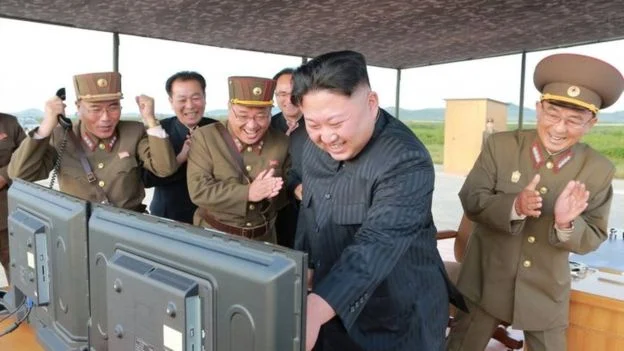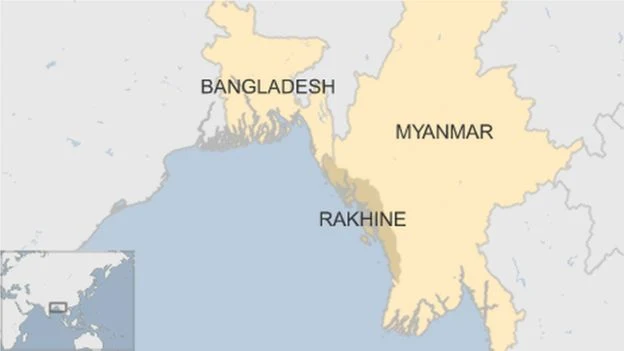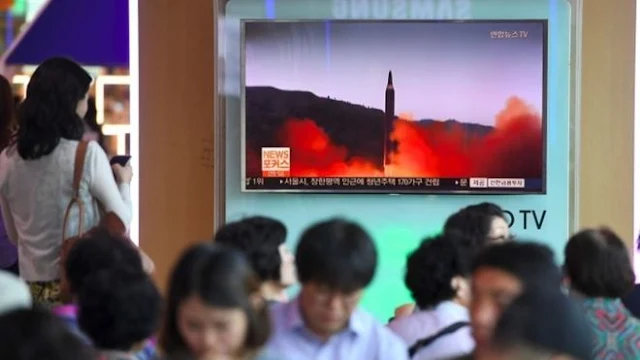North Korea will reach its nuclear force goal - Kim Jong-un
North Korean leader Kim Jong-un has vowed to reach the country's nuclear goals, according to state media.
The aim was to establish "equilibrium" of military force with the US, the KCNA news agency quoted him as saying.
Mr Kim's comments come after North Korea fired its latest missile over Japan - in what is being described as the country's farthest-reaching test.
The move split world powers who united behind new UN sanctions against North Korea just days ago.
"We should clearly show the big power chauvinists how our state attain the goal of completing its nuclear force despite their limitless sanctions and blockade," Mr Kim was quoted as saying by the KCNA.
He also said North Korea's goal was "to establish the equilibrium of real force with the US and make the US rulers dare not talk about military option for the DPRK [North Korea]".
- Are missiles a risk to planes?
- The weapons North Korea does not admit to
- Three minutes to shelter from a missile
Mr Kim personally watched the launch of a Hwasong-12 ballistic missile on Friday.
The missile reached an altitude of about 770km (478 miles), travelling 3,700km past the northernmost island of Hokkaido before landing in the sea, South Korea's military said.
The missile had the capacity to reach the US territory of Guam and experts say it is the furthest any North Korean ballistic missile has ever travelled above ground.
How the world reacted to the test?
US President Donald Trump said North Korea had "once again shown its utter contempt for its neighbours, and the entire world community", but that he felt more confident than ever that the US was ready should a military option be needed.
But Russia's ambassador to the UN, Vasiliy Nebenzia, urged caution, saying: "We think that threats, tests, launches, and mutual threats in fact should be stopped, and that we should engage in meaningful negotiations."
China accused the US of shirking its responsibilities.
"Honestly, I think the United States should be doing... much more than now, so that there's real effective international co-operation on this issue", China's ambassador to the US, Cui Tiankai, was quoted as saying by Reuters.
"They should refrain from issuing more threats. They should do more to find effective ways to resume dialogue and negotiation," he said.
Chinese irritation
Analysis by BBC's Carrie Gracie in Beijing
United Nations sanctions - no more no less.
From a Chinese ambassador, that is blunt language and signals Beijing's irritation over American pressure.
China feels it deserves more credit for the hard work and economic pain involved in enforcing two new rounds of UN sanctions within a matter of weeks. It also doubts that sanctions alone, however tough, will deter Pyongyang.
So Ambassador Cui Tiankai had his own advice for Washington, saying it should avoid making threats and instead resume dialogue.
The only satisfied party today is North Korea.
But China has insisted time and again that it will never accept North Korea as a nuclear weapons state, and it can't avoid the obvious and urgent question: how does China intend to stop it?
No new sanctions have been announced at the Council's meeting.
Why does this new test matter?
The launch took place from the Sunan district of the capital Pyongyang just before 07:00 local time on Friday (22:00 GMT on Thursday), South Korea's military says. Sunan is home to Pyongyang International Airport.
As with the last test on 29 August, the missile flew over Japan's Hokkaido island before splashing down in the Pacific Ocean.
Sirens sounded across the region and text message alerts were sent out warning people to take cover.
- Pyongyang has been developing weapons, initially based on the Soviet-developed Scud, for decades
- Conducted short and medium-range missile tests on many occasions, sometimes to mark domestic events or periods of regional tension
- Pace of tests has increased in recent months; experts say North Korea appears to be making significant advances towards building a reliable long-range nuclear-capable weapon
- On 3 September, North Korea said it tested a hydrogen bomb that could be miniaturised and loaded on a long-range missile
Parsons Green: Man arrested over Tube bombing
An 18-year-old man has been arrested on suspicion of terror offences in connection with Friday's attack on a London Tube.
The man was detained in the port area of Dover on Saturday by Kent Police and is being held at a local station.
Metropolitan Police Deputy Assistant Commissioner Neil Basu said the arrest was "significant", but the terror threat level remains at "critical".
Thirty people were injured after the explosion on a train at Parsons Green.
Rohingya crisis: Satellite images of Myanmar village burning
Rights group Amnesty International has released satellite images which it says show an "orchestrated campaign" to burn Rohingya villages in western Myanmar.
Amnesty said this was evidence security forces were trying to push the minority Muslim group out of the country.
The army says it is fighting militants and denies targeting civilians.
Some 389,000 Rohingya have fled to Bangladesh since violence began last month. They have long been persecuted in Myanmar as "illegal immigrants".
At least 30% of Rohingya villages in Rakhine state are now empty, the government says.
They have lived in the state in Myanmar, also known as Burma, for generations but are denied citizenship.
Myanmar has faced international condemnation over the crisis.
On Thursday US Secretary of State Rex Tillerson said Myanmar's democracy was facing a "defining moment".
"I think it is important that the global community speak out in support of what we all know the expectation is for the treatment of people regardless of their ethnicity," he said in London.
"This violence must stop, this persecution must stop."
A day earlier UN Secretary General Antonio Guterres said the Rohingya were facing a catastrophic humanitarian situation, and attacks on villagers were unacceptable. The UN Security Council has called for urgent steps to end the violence.
What does the Amnesty report say?
Amnesty said it had new evidence based on fire-detection data, satellite imagery, photos and videos, as well as interviews with eye-witnesses, of "an orchestrated campaign of systematic burnings" targeting Rohingya villages for almost three weeks.
"The evidence is irrefutable - the Myanmar security forces are setting northern Rakhine State ablaze in a targeted campaign to push the Rohingya people out of Myanmar. Make no mistake: this is ethnic cleansing," said Tirana Hassan, the group's crisis response director.
Amnesty said security forces would surround a village, shoot people as they fled and burn down their houses, describing the acts as "crimes against humanity".
It said it had detected at least 80 major fires in inhabited areas since 25 August, following attacks on police posts by the rebel Arkan Rohingya Salvation Army (Arsa).
No fires of this magnitude had been seen in similar periods over the last four years, Amnesty added.
The rights group said it had also received credible reports of Rohingya militants burning homes of Buddhist ethnic Rakhine but had been unable to verify them.
- Why won't Aung San Suu Kyi act?
- How much power does Suu Kyi really have?
- From human rights heroine to alienated icon
What do the authorities say?
Myanmar's envoy to the UN has blamed the Rohingya insurgents for the violence in Rakhine state and said that his country would never tolerate such atrocities.
Government spokesman Zaw Htay has urged displaced people to find refuge in temporary camps set up in Rakhine state, but said Myanmar would not be able to allow all those who fled to Bangladesh to return.
On Wednesday, the head of Myanmar's armed forces, Gen Min Aung Hlaing, said that the country "could not accept and recognise the term 'Rohingya' by hiding the truth" (meaning Myanmar's claim that they are illegal immigrants from Bangladesh).
"Rakhine ethnics [Buddhists] are our indigenous people who had long been living there since the time of their forefathers," he said.
- Who are the Rohingya group behind attacks?
- What sparked latest violence in Rakhine?
- Fergal Keane: Meeting Myanmar's hardline Buddhist monks
What other evidence is there?
At the government's own admission, 176 Rohingya villages, more than 30% of the total in northern Rakhine state, are now empty.
Reports of atrocities preceded the Amnesty report, with testimony from fleeing Rohingya of involvement by security forces in the razing of their villages.
Though access to Rakhine state is heavily controlled, the BBC's Jonathan Head was one of a few journalists taken on a government-run tour recently and witnessed Muslim villages being burned with police doing nothing to stop it.
While the current crisis has seen nearly 400,000 Rohingya flee, the UN says Bangladesh was already hosting several hundred thousand undocumented Rohingya who had fled earlier violence.
Other Rohingya have been living in camps for displaced people within Myanmar.
Who are the Rohingya?
There were at least a million members of the Rohingya ethnic group living in Myanmar, most of them Muslim, though some are Hindu. They are thought to have their origins in what is now Bangladesh and the Indian state of West Bengal, but many have been present in Myanmar for centuries.
The law in Myanmar does not recognise the Rohingya ethnic minority as one of its "national races" and they are effectively denied citizenship. Human Rights Watch describes the Rohingya as one of the largest stateless populations in the world.
"Restrictions on movement and lack of access to basic health care have led to dire humanitarian conditions for those displaced by earlier waves of violence," the group says.
Bangladesh's Prime Minister Sheikh Hasina has called on Myanmar to take the Rohingya refugees back.
North Korea fires second ballistic missile over Japan
North Korea has fired a ballistic missile across Japan, its second such provocative move in weeks.
South Korea's military said the missile reached an estimated altitude of about 770km (478 miles) and travelled 3,700km before landing in the sea off Hokkaido.
Japan's PM Shinzo Abe said his country would "never tolerate" North Korea's dangerous actions.
"If North Korea continues to walk down this path, it has no bright future," he said in a statement.
US Secretary of State Rex Tillerson also condemned the launch, which contravened UN sanctions.
He put the burden of response on China and Russia, nuclear-armed North Korea's main economic partners.
"China supplies North Korea with most of its oil. Russia is the largest employer of North Korean forced labour," he said.
"China and Russia must indicate their intolerance for these reckless missile launches by taking direct actions of their own."
Guam 'within range of rocket'
The South Korean military said the latest launch - the first since sanctions were tightened - took place from Sunan, the district where Pyongyang's international airport is located, just before 07:00 local time (22:00 GMT on Thursday).
The US and Japan said it was likely an intermediate range intercontinental ballistic missile (ICBM).
According to the initial estimates, it flew considerably higher and further than the missile fired on 29 August.
Japan had called that launch an "unprecedented" threat, while Pyongyang warned it was only "the first step" in its military operations in the Pacific.
The US Pacific territory of Guam, which North Korea claims to have plans to fire missiles towards, is 3,400km from Pyongyang, so would be within range of the latest missile.
- Pyongyang's missile and nuclear programme
- North Korea crisis in 300 words
- Have North Korea's missile tests paid off?
As with the last launch, the rocket flew over Japan's northern Hokkaido island before splashing down in the Pacific Ocean.
People were warned to take cover as raid sirens sounded.
Trump restores police surplus military equipment scheme
US President Donald Trump has lifted restrictions imposed by Barack Obama on the transfer of surplus military-style equipment to the police.
An executive order provides police with items including bullet-proof helmets and armoured vehicles.
Attorney General Jeff Sessions said the aim was to enhance public safety.
Mr Obama barred the military from handing over some types of military equipment to police after unrest in Ferguson, Missouri.
The ban followed criticism that police were too heavy handed in dealing with the protests that followed the killing of an unarmed black teenager by a white police officer in 2014.
The former US president was concerned about public reaction to images of heavily militarised police on the streets, saying it was important that police were perceived to be part of the community than being seen as an occupying force.
'We have your back'
But Mr Sessions argued that Mr Obama's restrictions went "too far".
"We will not put superficial concerns above public safety," he told a meeting of police officers.
"The executive order... will ensure that you can get the lifesaving gear that you need to do your job and send a strong message that we will not allow criminal activity, violence, and lawlessness to become the new normal.
"We have your back and you have our thanks," he told the police convention.
Under the terms of the executive order, government agencies are compelled to take prompt action to reverse President Obama's rules.
But the order has been criticised by civil rights groups and some Republicans in Congress.
"It is one thing for federal officials to work with local authorities to reduce or solve crime, but it is another for them to subsidise militarisation," Senator Rand Paul said in a statement.
Mr Paul said that he would work to introduce legislation to ensure there was transparency in relation to such transfers so that law enforcement agencies do not to gain possession of equipment which remains prohibited.
Subscribe to:
Comments (Atom)
Apple to scan iPhones for child sex abuse images
Apple has announced details of a system to find child sexual abuse material (CSAM) on customers' devices. Before an image is stored on...



















